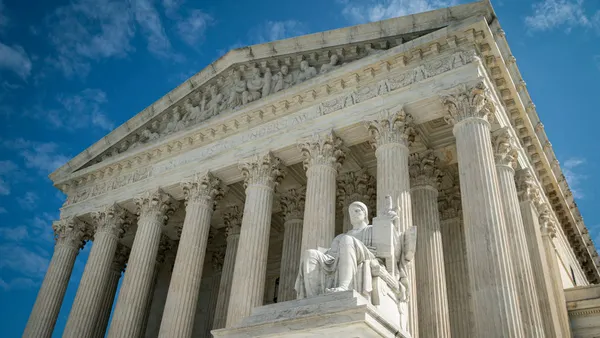Dive Brief:
- Safeway, Inc. has agreed to pay $75,000 to settle a U.S. Equal Employment Opportunity Commission (EEOC) lawsuit alleging that it violated the Americans with Disabilities Act (ADA) when it failed to provide an interpreter for a deaf applicant.
- According to EEOC's allegations, Joel Sibert applied online for several jobs at a Seattle Safeway store. He was selected for an interview based on his qualifications and experience working similar jobs; once he explained that he was deaf and needed an interpreter, however, the in-store hiring manager told him she didn't know anything about providing an interpreter and did not contact him again for an interview, according to EEOC. When he called to follow up, he was placed on hold or told no one was available, he said. The grocer hired several hearing individuals to fill the vacant positions, the agency alleged.
- In addition to the monetary payout, the company agreed to revise its career website and application to make it easier for applicants to request accommodations. It also will conduct ADA and accommodation training, distribute its modified ADA/accommodation policy to all employees once a year and ensure that recruiters understand Safeway's ADA obligations.
Dive Insight:
Rejecting a qualified applicant because of a disability violates the ADA, EEOC said in its statement announcing the settlement agreement. The law requires that employers provide reasonable accommodations to qualified workers and applicants, unless doing so creates undue hardship for the employer.
EEOC specifically mentioned in an enforcement guidance on reasonable accommodation that providing qualified readers or interpreters is often reasonable. In fact, it outlines a hypothetical situation in which an applicant requests a sign language interpreter for an interview. The fictitious employer cancels the interview and refuses to consider the applicant because it believes it would have to hire a full-time interpreter. "The employer has violated the ADA," the document says, stating that the employer "should have proceeded with the interview, using a sign language interpreter (absent undue hardship), and at the interview inquired to what extent the individual would need a sign language interpreter to perform any essential functions requiring communication with other people."
Noting that "not all people who are deaf will need accommodations to perform their jobs and many others may only need a few accommodations," the Job Accommodation Network offers several several suggestions for accommodating deaf applicants and employees, including apps developed for individuals who are deaf or hard of hearing and the use of instant messaging and texting, interpreters, white boards, strobe lights, CART services and more.
EEOC Seattle Field Director Nancy Sienko said in a statement that eliminating hiring barriers, especially those that affect people with disabilities, is "one of six national priorities identified by the Commission's 2017-21 Strategic Enforcement Plan." She noted that this is her district's second settlement resolving a lawsuit filed on behalf of a qualified applicant who was not given a chance to interview when an employer discovered that they were deaf.
Periodic compliance training can familiarize supervisors with the ADA and related laws, reducing the risk that they'll create liability.









